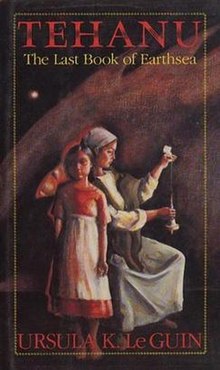Tehanu
Tehanu /təˈhɑːnuː/,[1] initially subtitled The Last Book of Earthsea,[2] is a fantasy novel by the American author Ursula K. Le Guin, published by Atheneum in February 1990.
[7] As described by the author, Le Guin, in a recorded afterward to the 2016 audiobook version, as Tehanu opens, approximately 25 years have passed since the events at the end of The Tombs of Atuan, "time enough for the girl Tenar to become a widow with grown children"; and "a day or two" have passed since the close of The Farthest Shore and Tehanu's Chapter 4, "Kalessin", "time enough for [that] dragon... to carry Ged from Roke to Gont.
[citation needed] Specifically, the novel makes clear that she had rejected the life of an aristocrat in Havnor, and instead decided to reside on Gont.
[citation needed] On Gont, she marries the farmer, Flint, who referred to her as Goha, a local word for a "little, white, web-spinning spider" there, as she was small, and fair-skinned, and a good spinner of wool (Tehanu, Chapter 1).
Ged (also called Sparrowhawk) arrives on the back of the dragon Kalessin, unconscious and near death, having spent all his wizardly powers in sealing the gap between the worlds of the living and the dead created by the evil sorceror Cob.
Confused by Aspen's magic, Tenar is almost overtaken by Handy, but escapes to Gont Port, taking refuge in the king's ship.
Therru runs to the cliff behind Ogion's cottage, where she calls to the dragon Kalessin for help, and reveals her true nature: she is in fact "a double being, half human, half-dragon".
whereas the trilogy was written around classic fantasy tropes of perilous quests, heroic actions, and larger-than-human forces, Tehanu focuses on social interaction and emotional resonance.
Tehanu uses the lens of everyday events and a strong anti-patriarchal viewpoint to not only explore the future of the two recurring characters—and of Earthsea itself—but to reinterpret them.
[11] Bhanu goes on to note that[t]he second trilogy enlarges, interrogates and deconstructs the first [and that] ...the text has emerged from... a changed cultural ethos, in particular the feminist movement.
... Tehanu redresses the balance by presenting a woman’s world, interests, magic and problems, through the perspective of Tenar... now a middle aged widow.
The men on the other hand seem weak and limited in vision even when well meaning, [and] misogynistic, depraved and vicious when given up to... evil...[11]Michael Dirda, writing for The Washington Post, notes that Tehanu "reveal[s] what happened to [the series'] hero and heroine in old age", and with its emphasis on these aging, earlier novel protagonists is thus an enlargement of the earlier Earthsea trilogy (which was largely just marketed for young adults).
The review notes that Ged and Tenar are "past middle age", reflecting the slower action, but "even young readers will be beguiled by the flawless, poetic prose, the philosophy expressed in thoughtful, potent metaphor, and the consummately imagined world".
